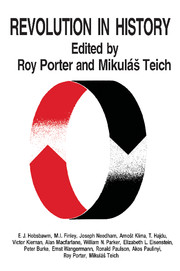Book contents
- Frontmatter
- Contents
- Notes on contributors
- Introduction
- 1 Revolution
- 2 Revolution in antiquity
- 3 Social devolution and revolution: Ta Thung and Thai Phing
- 4 The bourgeois revolution of 1848–9 in Central Europe
- 5 Socialist revolution in Central Europe, 1917–21
- 6 Imperialism and revolution
- 7 Socio-economic revolution in England and the origin of the modern world
- 8 Agrarian and industrial revolutions
- 9 On revolution and the printed word
- 10 Revolution in popular culture
- 11 Revolution in music – music in revolution
- 12 Revolution and the visual arts
- 13 Revolution and technology
- 14 The scientific revolution: a spoke in the wheel?
- 15 The scientific-technical revolution: an historical event in the twentieth century
- Index
9 - On revolution and the printed word
Published online by Cambridge University Press: 05 February 2015
- Frontmatter
- Contents
- Notes on contributors
- Introduction
- 1 Revolution
- 2 Revolution in antiquity
- 3 Social devolution and revolution: Ta Thung and Thai Phing
- 4 The bourgeois revolution of 1848–9 in Central Europe
- 5 Socialist revolution in Central Europe, 1917–21
- 6 Imperialism and revolution
- 7 Socio-economic revolution in England and the origin of the modern world
- 8 Agrarian and industrial revolutions
- 9 On revolution and the printed word
- 10 Revolution in popular culture
- 11 Revolution in music – music in revolution
- 12 Revolution and the visual arts
- 13 Revolution and technology
- 14 The scientific revolution: a spoke in the wheel?
- 15 The scientific-technical revolution: an historical event in the twentieth century
- Index
Summary
When considering the relationship between the concept of ‘revolution’ and the advent of the printed word, two quite different but equally problematic topics come to mind. First there is the problem of how best to describe the advent of printing itself. Should we regard it as just one more step in the long evolution of the book? Or should we view it instead as a revolutionary event? If we agree on the latter course, then what sort of revolution was entailed? Second there are many unsolved (and, indeed, several unposed) problems concerning the effects of printing on all the other revolutions (intellectual and political) which have occurred since Gutenberg's time. It would be impossible to do justice to either of these two topics let alone to cover both in a brief essay. The following discussion, which will focus on developments in Western Europe in the age of the hand press, is intended to be suggestive rather than definitive and will touch on only a few of the many issues that seem worth further thought.
I THE PROBLEMATIC PRINTING REVOLUTION – ABRUPT RUPTURE; PROLONGED IRREVERSIBLE PROCESS
Some years ago, when Nicolas Barker gave a lecture at the Library of Congress on the advent of movable type, he titled his talk: ‘The invention of printing: revolution within revolution’. He thus drew attention to a prevalent semantic confusion. At least two different processes of change are now being designated by one and the same term. ‘Revolution’, as currently employed, may mean a decisive break with a long-enduring tradition or institution. Or it may mean a prolonged, irreversible, cumulative process with effects that become ever more pronounced the longer it goes on. These two different meanings are well illustrated by discussion of changes wrought by printing as the following comments may suggest.
In the first place, the term revolution is used, as most working historians commonly use the term, to argue against a thesis that stresses continuity and gradual change.
- Type
- Chapter
- Information
- Revolution in History , pp. 186 - 205Publisher: Cambridge University PressPrint publication year: 1986
- 1
- Cited by

